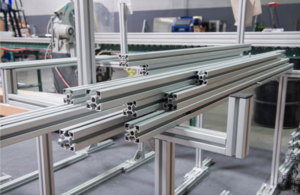TRA upholds recommendations on aluminium extrusions from China
The Trade Remedies Authority has published its reconsidered decisions relating to anti-dumping measures on imports of aluminium extrusions from China.

The Trade Remedies Authority has today (27 February 2024) published its reconsidered decisions relating to anti-dumping measures on imports of aluminium extrusions from China.
The TRA’s reconsidered decisions are to uphold the two original decisions: the first decision relating to the recommendation to impose anti-dumping measures on certain aluminium extrusions from China; and the second decision relating to the final negative determination in relation to large aluminium extrusions (products over 310mm cross-sectional dimension and products with a weight greater than 14kg/metre).
The reconsideration was initiated following an application received from a UK producer requesting that the TRA reconsider its original decisions on imports of aluminium extrusions.
The grounds for requesting a reconsideration are based on the applicant’s claims that the anti-dumping duties imposed do not accurately reflect the level of injurious dumping. The applicant also considers that the measure should not have excluded large extrusions.
About the TRA’s original decisions
During its original investigation, the TRA determined that injury to the UK industry was occurring, having found clear evidence of price undercutting, indicating that UK businesses were struggling to compete with the dumped imports. It therefore recommended that a new anti-dumping duty be applied to imports of aluminium extrusions from China to the UK. The TRA also gave a final negative determination on certain types of large aluminium exclusions (meaning that the measure on these products was not extended), as the TRA found no evidence that they are produced in the UK.
In December 2022, the Secretary of State for Business and Trade accepted the TRA’s recommendation that a new anti-dumping duty be applied to imports of certain aluminium extrusions from China to the UK and that duties on large aluminium extrusions should not be applied.
Following the Secretary of State’s decision, the TRA received an application from one domestic producer asking the TRA to reconsider the original decisions. The TRA’s reconsideration considered the grounds submitted by the applicant within the rules set out in the UK’s regulatory framework and the underlying World Trade Organisation obligations.
Notes to editors
- The Trade Remedies Authority is the UK body that investigates whether new trade remedy measures are needed to counter unfair import practices and unforeseen surges of imports.
- The UK trade remedies regime is set by the Taxation (Cross-Border Trade) Act 2018 and the Trade Act 2021, which operationalise the World Trade Organisation (WTO) agreements covering trade remedies.
- Reconsiderations are part of the process that parties can use to ask the TRA to look again at its decisions. Many government departments, non-departmental public bodies and other government agencies (including decision-making bodies on taxation and benefits) provide for interested parties to request an internal reconsideration of a decision as part of their standard processes.
- For a reconsideration to be undertaken by the TRA, applicants must meet the following criteria:
- Set out the grounds for their application.
- Explain the outcome they are looking for.
- Demonstrate that they are eligible to apply for a reconsideration of this decision.
- If an application does not meet any or all the three criteria set out above, the TRA will review this and may ultimately reject an application.
- Further information on the TRA’s process for reconsiderations can be found in the TRA’s online guidance.
- Anti-dumping measures are one of the three types of trade remedies allowed by the World Trade Organisation (WTO). These measures place duties on products when they are dumped – unfairly imported into a country at prices below what they would be sold for in the country where they are made. The other two measures are countervailing measures which counter unfair subsidies on imported goods and safeguard measures which address unforeseen surges of imports.